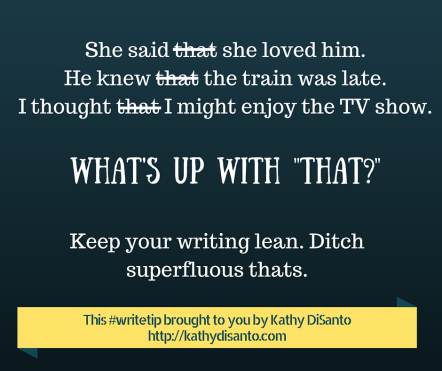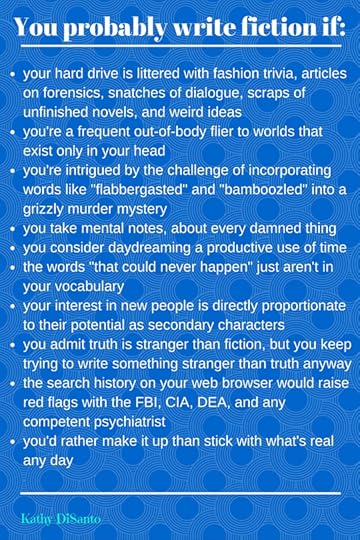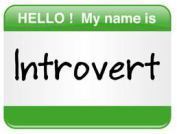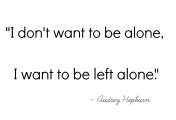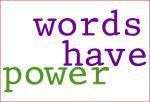Kathy Disanto's Blog
March 15, 2017
My Blog Has Moved!
Please bookmark the new location of my blog, now attached to my website! Do it today, because you won’t want to miss “3 Insights Inspired by The Wonderful Wizard of Oz!”
[image error]


May 18, 2016
6 Nifty Resources No Indi Author Can Do Without
To paraphrase a famous frog, “It’s not easy being indie.”
Actually, it’s not easy being any kind of writer/author, self-published or traditionally published, but wearing the many hats in every Indie wardrobe–author, marketer, social media manager, designer, newsletter editor … did I miss any?–presents special challenges. We’re talking about the kind of challenges that either drive you to drink, force you to beat your head against the wall, or have you tossing up your hands in defeat.
We can all use a little ….

Am I right? Of course I am. Which is why, I’m here to offer some in the form of 6 nifty resources no Indie should do without. (Purple headers = links, of course.)
Bublish
How would you feel about a tool that lets you write formatted e-books, market those books in a unique way, build your brand, connect with fans, and track reader engagement? This is no fantasy people, this is the reality of Bublish, which lets you do all of the above and a whole lot more. You can try out some of the features via the free plan or all of them via free trial, but I’m sure you’ll want the full-fledged Authropreneur package for either $9.99/month or $99/year.
Bublish is based on the book bubble, a unique and oh-so-posh marketing strategy that lets you send out an excerpt of your book via Facebook, Twitter, or e-mail. Here’s what your basic book bubble looks like:
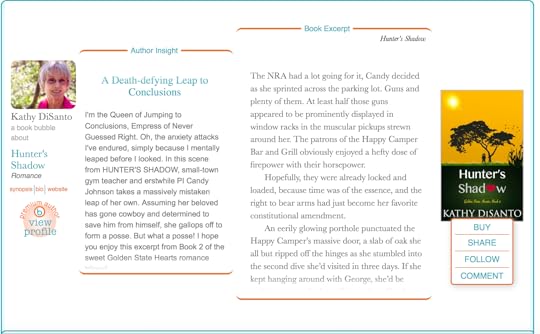
Slick, no? Seriously, what’s not to love? Save yourself a lot of time and effort designing go-nowhere ads, and give Bublish a try.
World Literary Cafe
Whoever said you get what you pay for obviously didn’t know about World Literary Cafe, which you can sign up for, as we say in the trade, absolutely free. Billed as the place “Where authors and readers unite,” WLC offers more bennies than you can shake your proverbial indie stick at. Check out these amazing resources:
training classes (some free, some for a fee)
a free book-marketing video
a Facebook like exchange
a Twitter follow exchange
a blog follow exchange
tweet teams
a free author toolbox
tips on how to maximize your free days on KDP
more, more, more!
Listen, you’d have to be brain dead to miss out on all these goodies!
Canva
Did you know social media content with colored visuals gets 80% more views? Hoo-hah! Is that a valuable tip, or what? And here’s another: You can create eye-catching social media posts for free using Canva. Well, for free unless you decide to use one of their paid graphics, but even those are one $1 each. The templates–Facebook post, Twitter post, Pinterest graphic, and so on–have already been created. All you have to do is point and click!
Oh, and if you’re looking to create a header of some kind, Canva has got you covered there, as well. You can even create your own templates, say, a specifically sized header to use on your website!
Hootsuite
Although some of your social media posts should be organic–marketing speak for posted in real time–you can make life a lot easier on yourself by scheduling other posts ahead of time on Hootsuite, which works for Facebook, Twitter, Google Plus, LinkedIn, WordPress, Instagram, and YouTube! And get this, you can schedule them weeks in advance!
Conventional wisdom has it that you should post:
no more than twice a day on Facebook
three times per day (at most) on Google+
at least three times a day on Twitter (although followers tend to lose interest after the third tweet)
once a day on LinkedIn
Obviously, being able to schedule at least a few of those posts ahead of time will leave you more time to do what you do best: write.
Font Squirrel
Looking for a safe place to download free and/or almost-free fonts? Font Squirrel has got your back! Plus, all their fonts are licensed for commercial use.
MailChimp
The e-mail lists is one of the best promotional tools out there, because it allows you to form personal relationships with your readers. We’re not talking about using your list purely to make sales pitches, but sharing personal news, your own book reviews, special subscriber-only offers, and such, in order to exponentially build your fan base. MailChimp is a terrific tool you can use to create a newsletter, the occasional targeted e-mail campaign–say, to announce a book launch–or a coupon. Membership is free (although you can upgrade), and they offer plenty of themes and templates you can edit to make your own. Built-in analytics track the size of your list and give you an idea how well your campaigns are doing.


December 12, 2015
Publish & Move On
My launch date (December 23) has no particular rhyme or reason. My marketing “campaign” will no doubt be sporadic, conducted according whim and wild hair. I won’t be tracking sales, will evince only mild interest in reviews.
So. I’ve either gone completely loony tunes, or I’ve found an approach–okay, a non-approach–that works for me. Or both.
Probably both.
I won’t sing “The Marketing Blues” again in this space. But I hope you’ll allow me to sing a few verses of “The Hallelujah, I’m Writing Again Chorus.”
I found the joy again. All I had to do was forget about earning any kind of a living, exorcise the numbers demon, and remember why I started writing in the first place: Because I love it. Because it’s what I do.
So, on December 23, I’ll publish Hunter’s Shadow, book 2 in my Golden State Hearts Trilogy. And then I’ll move on. Move on to the sequel to Amanda’s Eyes. Move on to book 3 in the trilogy, Not Far Enough. Hunter’s poor shadow will have to navigate that cold, cruel self-publishing world without much help or attention from me. (Unless I get hit on the head and forget how much I hate marketing and how joyless it leaves me as an author.)
Any living to be earned will spring from Social Security, such as it is, and my pension, such as it is. (Not to mention the occasional freelance gig on motorcycle tool kits, National Prime Rib Day, or drug testing in Idaho.)
“Why publish at all if you don’t want to make money?”
Well, I wouldn’t mind making money, of course. And in the (so far) unlikely event money happens, just let me say, the party’s on me.
I publish, because that’s what you do with a book. I publish, because not publishing strikes me as a cop out. I publish, because if even one person reads my books, my characters have come alive for someone besides me. I publish, because you just never know.
So, bon voyage, Hunter’s Shadow.
I’m moving on.
P.S. That link thing, up there? Where I linked to my books? That’s what you call on-a-whim, why-not, wild-hair marketing. In case you were wondering.


November 23, 2015
Cut “That” Out!
November 1, 2015
Are You an Honest-to-God Fiction Writer?
Writing fiction is a unique vocation. The only way to know, for certain sure, that you are a fiction writer, is to go through the checklist:


October 30, 2015
Haunted
In my dream, the old house stands on a downhill slope, three wearily dignified stories crowding a sharp spit of corner rimed in brick.
She rises darkly and alone at the far edge of a small town–isolated from that mountain-cupped, all-American pocket of life, where the roads rise and fall like roller coaster tracks, streets are tree lined, and Memorial Day erupts in laughter and picnics, parades and bright bunting.
Years of neglect can be counted–like an old woman’s wrinkles–in her flaking paint and bare wood, weathered gray.
But inside–oh, inside! The first floor is a chockablock tumble of rooms scattered with dressers, desks, cupboards, and bookcases. Drawers and more drawers, drawers within drawers, and each one a mini pirate chest. Dreaming, I delight in my finds: sparkling rings and necklaces, books of poetry, a fountain pen with a delicately caved nib.
One flight up, the space is open and airy, the floor a cool-blue lake of marble flowing down three steps to a lapis lazuli hearth flanked by tall, swan-necked ceramic vases filled with white lilies. Glass doors at either end of the long room open onto balconies, one with a view of gently rolling hills, the other overlooking my backyard ponds.
The third floor? I don’t go there. It’s haunted, you see, by the ghost of a woman who watches and waits. Coldly waits, daring me to climb those stairs and open the door. Maybe she’ll kill me if I do.
So I live half a life in two-thirds of a house, surrendering that upper story and the brightest edge of my happiness, trying to pretend she isn’t there. Trying to convince myself she can’t turn the knob from her side and come for me.
But you can’t pretend away dead lives that lie in wait. Everyone who walks through my door knows about her. She makes them edgy. They don’t even stay long enough to sit and talk.
Except for the hard-eyed, wiry-haired, redheaded scarecrow who sold me the house. She doesn’t see the problem. What do I need with a third story anyway? “Live down here,” she says. “Ignore her,” she says. “I did.”
The neighbor recommends exorcism.
The ghost waits.
Until one morning I wake up and realize the ghost is my past.
I do not know what makes a writer, but it probably isn’t happiness.
~William Saroyan
If I had a nickle for every writer who associated past (or present) unhappiness with the art, I’d have … well … at least a few dollars.
Rudyard Kipling said, “(An unhappy childhood was not) an unsuitable preparation for my future, in that it demanded a constant wariness, the habit of observation, and the attendance on moods and tempers; the noting of discrepancies between speech and action; a certain reserve of demeanour; and automatic suspicion of sudden favours.”
According to Steinbeck, it takes an unhappy childhood to make a writer.
And Avi Steinman insists, “We write because we are constantly discontented with almost everything, and need to use words to rearrange it, all of it, and set the record straight”
Well, that’s depressing. I’d rather not buy into their sentiments, thank you very much.
But there’s that ghost in my dream, the ghost of a personal past populated with plenty of pain. (Alliteration as a tension-relieving device. Who knew?)
Based on my dream–and the frequency with which it visits me–I suspect I’m not quite through dealing with the bad old days. Based on my dream, it’s clear I’d dearly like to avoid doing so. My haunted third story strikes me as a dangerous place to visit. But, you know, one does what one must, if one wants to boot the ghost out of one’s attic.
And, trust me, I do.
What I find interesting is, the books I’ve written so far don’t deal much with pain. They’re not deep, they don’t explore the third story. They’re entertaining, humorous at times, edge-of-the-seat at others. Most telling of all, they tend to end happily. This is no doubt a fair indication of how determined I am to live on the fun floors of my old house. Also, how much I enjoy telling stories that might, for a short little while, let other people live on the fun floors of their houses.
Given the attics that haunt us all, I figure a respite on the fun floors of the house is a fine and good reason to write what I do. We can’t spend every minute of our lives facing our ghosts.


August 7, 2015
Quitting Time?
I’m 64 years old, so let me just say 1:15 a.m. is way past my bedtime. Yet here I sit. Sweating, because I’m too cheap to turn on the AC. Thinking. Blogging. Sweating. Pondering. Basically driving myself nuts, trying to answer one yes/no question: Is it time to stop writing novels?
Notice the absence of the adjective simple, as in, one simple question. I don’t do simple. I complicate. Everything. It’s a gift.
See, here’s the rub. I used to love to write. Maybe I still do. But, you know, I got caught up in the whole indie marketing frenzy–not to be confused with a shark feeding frenzy, although, hey … maybe they’re not that different. I tried, but I can’t keep up. I’m shell shocked. Seriously. I sometimes think I’ll run screaming down the street—wild-eyed and possibly buck naked—if I see one more Facebook post about how I could be “10 Tweets Away from Bestseller” or make a killing with “5 Benign Book Signing Strategies” or “Instantly Instagram an Irresistible Author Platform.”
So I ask myself. Should I, an unrepentant marketing failure, a crotchety promo dropout, continue to write? I have neither yen nor breath to toot my own horn. I get cranky just thinking about it. Ergo, wouldn’t it make sense to just stop, for God’s sake?
Absolutely. And I’ve made up my mind to do exactly that, at least a hundred times. Except ….
I can’t stop thinking about writing. No problem at all resisting the urge to actually do it, but I can’t stop thinking about the books I have out there or the ones in progress or the unborn stories running laps in my brain. I’m afflicted with snippets of dialogue, plot points, conflicts, characters. I get ideas, dammit.
I recently confided in my blog-tour coordinator—employed back when I could afford such—my urge to switch off the Mac, throw out the pencils, burn my thesaurus. She said no, don’t do that, all our reviewers loved your books.
I spent all night updating my website. The one I won’t need, on account of I’m not going to write books any more.
Maybe.
Crap.
I need another glass of wine.


March 21, 2015
Why Remix?
As a writer, I was a late bloomer. Eighteen years ago, I was in my early forties when I decided to write my first book. Crazy, right?
But you know what they say: ���Better late than never.���
In my case, better took a quantum leap into fabulous when Bantam bought that book and its sequel for its Loveswept series romance line. I was delighted (read: exuberant, bordering on rapturous). I learned a great deal from my experience with Bantam���thanks in particular to my editors Joy Abella and Beth De Guzman���and I owe them more than I can say.
Now let���s fast-forward a decade. Or two.
Those two books���which remain dear to my heart���are sadly, out of print. They were never available as e-books. To boot, these engaging stories, once critically acclaimed���For Love or Money won a Romantic Times Reviewer���s Choice Award���are now hideously dated. (I mean, who knew back in 1997 we���d all carry around cell phones one fine day?) Finally, in the past eighteen years I���ve grown as a writer, giving new meaning to the ever-wistful refrain, ���If I had it to do all over again ….���
Taking those factors into account, the decision to ���remix��� the two existing books as semi-sweet romances (a genre I personally invented for books that are sensual but not explicit)���and add a third to create the Golden State Hearts Trilogy���was a no-brainer.
Book one, the new and improved��For Love or Money, will launch on April 1st. (Making me an April Fool for romance.) Book two,��Hunter In Disguise, is slated for late July. And book three–featuring two middle-aged romantic leads and as yet untitled–will debut just in time for Christmas.
Meanwhile, I’m making like a Mixmaster (Mixmistress sounds sort of kinky) and having the time of my life!

March 1, 2015
Just for Fun: Introverts
Many, if not most, writers are introverts at heart. That being the case, I thought we could all unite here–separately, in the comfort of our own homes, of course–to chat about our common foibles. Sure, I get the fact that we’re far from a new topic. Since the dawn of time–or thereabouts–introverts have been pleading for understanding and offering tips on how to get along with and make life easier for us. Cyberspace teems with blogs and articles about same, and Susan Cain wrote a bestseller about us.
Unfortunately, our cries for acceptance, heart-rending though they may be, all too often go unheard by our bee-busy-buzzy extroverted friends.�� Still, on the off chance some stray, snowed-in extrovert is dying for company, scouring the Interweb for somebody, anybody, to talk to, I’m willing to oblige. Listen up.
To begin with, seeing as how introverts make up a mere 25% of the world���s population, I decided I ought to provide a checklist of key characteristics you can use to recognize us. You may even discover you���re one of us. If you do, don���t be surprised if your first reaction is denial. That was my first reaction, at least until I learned introversion ��� shy, a fact I���m constantly explaining to those who know me and my big mouth only too well. As for retiring, you’d be amazed at the far-reaching effects a few good introverts have had on history. For example:
Albert Einstein (who had enough chutzpah to turn the world of physics on its head)
Mahatma Gandhi (who had enough chutzpah to turn the British empire on its head)
Dwight Eisenhower (who had enough chutzpah to turn the Third Reich on its head)
Stephen Spielberg (who produces groundbreaking movies like ET, Letters from Iwo Jima and Schindler���s List)
Michael Jordan (fearless on the basketball court, and a terrific salesman, although the less said about underwear here, the better)
Steve Martin (a wild and crazy guy)
Clint Eastwood (Dirty Harry, Gunny Hightower and the mayor of Carmel, mind you)
Johnny Carson (yes, the Great Carnac himself)
Mother Theresa (who comforted millions of suffering souls in India and around the world)
Shy?�� I don���t think so.
But I digress.�� We were talking about how to recognize an introvert, and I promised you a checklist. Never let it be said I didn’t have the chutzpah to follow through.
You might be an introvert, if ���
your favorite spot at any given party is that cozy corner where you can happily, albeit safely, observe extroverts in action.
your first reaction to stress is a desire for space and plenty of it.
your last reaction to stress is a desire to talk about what���s bugging you.
you think a good weekend is one when nobody calls, visits, or emails.
you hold life���s most important bits close to the vest.
you like people but prefer them in small doses and need time alone to recharge after contact.
your mental calendar is full, your social calendar, not so much ��� and that���s fine and dandy by you.
your worst nightmare is the well-meaning friend or relative who���s decided you���re shy or lonely or depressed and just need to be ���drawn out.���
you visit a new church and hesitate to fill out the visitor���s card, because you know it will unleash a kindly, completely overwhelming flood of invitations to a) join small groups, b) come to dinner or c) ���get together and chat.���
There. Does that help? Did you recognize yourself or someone you care about? If you find yourself facing that most disquieting of epiphanies–i.e., that you have (or are) an introvert in a family of extroverts–don’t panic. I���m about to suggest a few coping strategies. Not that we introverts expect to be coddled, mind you, but remembering a few salient points will keep feathers unruffled all around.
Don���t take it personally, when we go hedgehog. It���s not you; it���s us. We���re not mad, we still love you, we just need some time alone to recharge. Depending on the circumstances, recharging can take anywhere from 5 minutes to 5 months.
Don���t ask, ���Are you all right?��� or ���Is anything wrong?��� or ���Do you want to talk?��� The answers are:�� ���Yes,��� and ���Only the fact that I���m not alone right now,��� and ���Absolutely not, but I���ll call you, if that changes.���
If you���re getting grunts, hmmms or other monosyllabic answers, or we’re giving you that I���m-in-an-alternative-universe stare, we probably need some space.
We do occasionally erupt into nonstop chatter. This usually happens after a prolonged period of ���working things out in our heads.��� Pretend you���re listening, smile and nod, remind yourself that this, too, shall pass–and thank God these eruptions tend to be infrequent.
In times of extreme stress, we find invitations, phone calls, shooting the breeze, and Facebook posts that have to be shared to prove our compassion or social consciousness extremely taxing. Like Greta Garbo, we want to be alone. We want peace and quiet, online and off. We need to think, to process. (As opposed to extroverts, who seem to process every live-long thing out loud. I can���t tell you how many times an extrovert has told me���in excruciating detail���about his/her current problem, then concluded cheerfully, ���Thanks!�� Talking to you has helped me work it all out in my mind.��� How that happens with all that gabbing going on is a mystery to me, but the system apparently works for them.)
Finally, when we really start to get on your nerves, remember:�� While we���re doing our withdrawn-uncommunicative-introversion schtick, we may be formulating the Theory of Everything or composing the Great American Novel or inventing the solution that will permanently straighten your naturally curly hair.
Did I miss anything? Feel free to comment and let me know!

January 31, 2015
Tools of the Trade, Part 1: Words
ster���e���o���type�� /��ster������t��p/ noun 1. a widely held but fixed and oversimplified image or idea of a particular type of person or thing.
I get this. If you’re an indie author, you get this, because, let’s face it, indies have a bad rep in some circles. Now we can’t do jack about folks who believe writing is easy, and/or we’re in this for the money. No changing minds that color all indies as half-witted hobbyists, geeky basement dwellers, ditzy housewives, or bored retirees.
But before I tumble off my soapbox laughing–or foaming at the mouth–let me add this:�� Even Psychology Today admits some stereotypes grow like twisted pearls around a kernel of truth. Our kernel is this:�� We’ve got too much half-assed writing out there. Not the sole province of indies, I’ll grant you, but we can only clean our own house.
And speaking of houses, you wouldn’t try to build one without tools–well, not unless you’re Popeye the Sailor, who used to drive nails with his fists, and even he couldn’t build a book without the right tools. For the next few weeks, I’m gonna make like Lowe’s, offering tips and tools for your building pleasure. Today’s special, laying a strong foundation.
We start by repeating our mantra for this Saturday:
You bet they do, so don’t get sloppy with them. Would you get sloppy with a band saw–whatever that is? No way. Well, to paraphrase Edward Bulwer-Lytton, words are mightier than band saws. Think about it.
Words are wonderful. Hobgoblin, finagle, lambaste, titular, weensy, claptrap, crackerjack, fluff, knucklehead, quisling, snout, porcine … I mean, you gotta love ‘em, right? So choose the right one. If you won’t listen to me on this, listen to Mark Twain.
The difference between the right word and the almost right word is the difference between lightning and a lightning bug.
Choosing the right word is key for, oh, let me count the ways. Nail your nouns, you won’t need to swaddle them in adjectives that bloat your writing. A strong verb will free you from adverbs, which as Stephen King assures us, pave the road to Hell. So forget the bad storm and heavy rain. You’ve got your deluge, your downpour, or, if you’re in Texas, your frog-strangler. Jettison smiled wryly or widely or sweetly in favor of smirked, beamed, leered, grinned, or simpered.
Sad to say, sometimes the perfect noun or verb is nowhere to be found. In that case, you’ve got nowhere to go but adjectives or adverbs, so go for the heavy lifters. And use as few as possible. Sticking with the storm theme: sheeting rain, shrieking wind, soupy fog. Smile fleetingly or darkly or crookedly. And for God’s sake, don’t be afraid of the unusual. Check out this evocative image from J.D. Robb’s Conspiracy In Death:�� “the thin and sticky hand of charity.”
See what I mean? And I may I just say, “Damn, I wish I’d written that.”
Make use of all your word tools. Onomatopoeia, for example. You probably know, but in case you don’t, onomatopoeia is “the formation or use of words such as buzz or murmur that imitate the sounds associated with the objects or actions they refer to.” (Thanks for the cut-and-paste, thefreedictionary.com!) You’ll find a nice list here. In case you’re curious, a few personal faves include plunk, jitter, plop, babble (referring to speech, not brooks), eew, grit, and gurgle. I could go on and on, so please … stop me now!
Alliteration is another handy tool, but you want to use this one with caution, unless you’re writing standup comedy, and even then, you don’t want to go all Peter Piper picked a peck of pickled peppers. Check out these powerhouse examples:
“I’ll kill him,” he said, “in all his greatness and glory.” ~Old Man and the Sea
“his appearance was something displeasing, something downright detestable” ~Dr. Jeckyll and Mr. Hyde
“the sibilant sermons of the snake” ~The Gargoyle (nice combo of alliteration and onomatopoeia, yes?)
ballbuster ~almost any mainstream mystery novel
Finally, as I’ve often said–much to the dismay of friends and family everywhere–if you’re serious about words, if you want to learn to unleash their power, you need to read poetry. (I heard that groan. Suck it up.) Poets rule when it comes to the efficient, effective use of words. Read and learn:
Something there is that doesn’t love a wall,
That sends the frozen-ground-swell under it,
And spills the upper boulders in the sun,
And makes gaps even two can pass abreast.
Frozen-ground-swell, spilling boulders? Oh yeah, words have power ….

